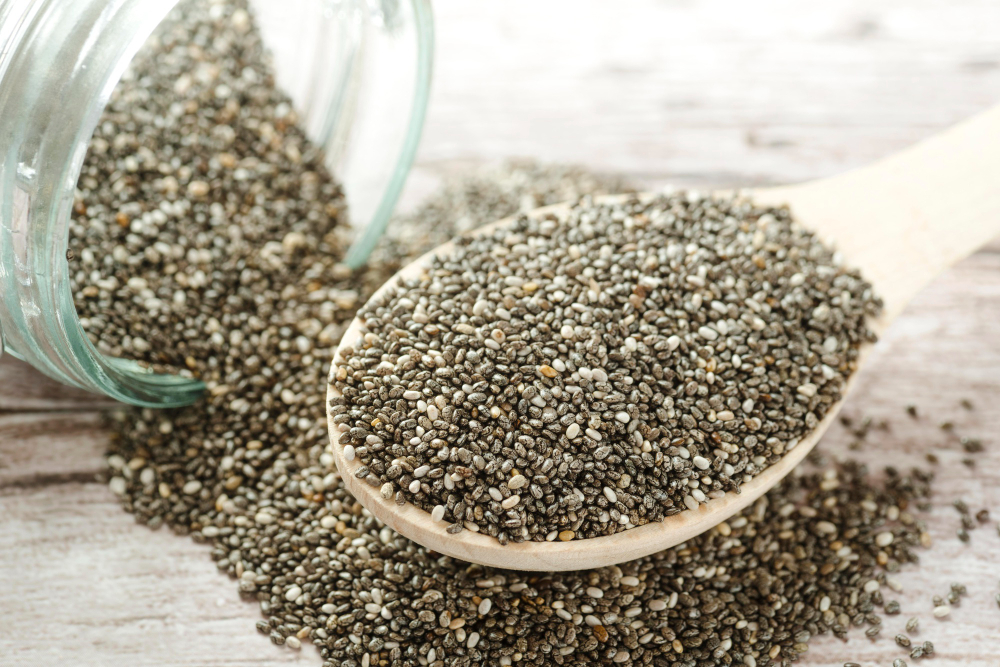Chia seeds have a rich history dating back to ancient civilizations such as the Aztecs and Mayans, where they were revered for their nutritional and medicinal properties. Fast forward to the modern era, and chia seeds have experienced a resurgence in popularity within the health and wellness community. Renowned for their exceptional nutrient profile and extensive health benefits, these small seeds have earned the illustrious title of “superfood.”
Despite their diminutive size, chia seeds are packed with essential nutrients contribute to overall well-being. They are an excellent source of fiber, protein, omega-3 fatty acids, vitamins, and minerals, making them a nutritional powerhouse in superfoods. Their versatility and adaptability make them an ideal addition to any diet, whether you’re looking to boost your energy levels, support your immune system, or enhance your overall health. Additionally, you can explore the question, The Health Benefits of Apple Cider Vinegar.
1. Highly Nutritious:
Chia seeds are a nutritional powerhouse, packed with a wide array of vitamins, minerals, and antioxidants. They are an excellent source of fiber, providing nearly 40% of your daily recommended intake in just one ounce. Additionally, chia seeds are rich in protein, containing all nine essential amino acids, making them a valuable source of plant-based protein for vegetarians and vegans. Furthermore, chia seeds are loaded with omega-3 fatty acids, which are essential for brain health, heart health, and reducing inflammation in the body.
- calories: 138
- protein: 4.7 g
- fat: 8.7 g
- alpha-linolenic acid (ALA): 5 g
- carbs: 11.9 g
- fiber: 9.8 g
- calcium: 14% of the Daily Value (DV)
- iron: 12% of the DV
- magnesium: 23% of the DV
- phosphorus: 20% of the DV
- zinc: 12% of the DV
- vitamin B1 (thiamine): 15% of the DV
- vitamin B3 (niacin): 16% of the DV
2. Loaded with Antioxidants:
Antioxidants play a crucial role in protecting your cells from damage caused by free radicals, which are harmful molecules that can contribute to chronic diseases and aging. Chia seeds are rich in antioxidants, including flavonoids, quercetin, and chlorogenic acid, which help neutralize free radicals and reduce oxidative stress in the body. By incorporating chia seeds into your diet, you can help protect your cells from damage and promote overall health and longevity.
- Chia seeds contain various antioxidants, such as flavonoids, quercetin, and chlorogenic acid, which help combat oxidative stress and protect cells from damage caused by free radicals.
- Antioxidants play a crucial role in reducing the risk of chronic diseases and promoting overall health and longevity.
3. May Support Weight Loss:
Chia seeds are often touted as a weight-loss aid due to their high fiber and protein content. Fiber helps promote feelings of fullness and satiety, reducing appetite and preventing overeating. Additionally, chia seeds absorb water and expand in the stomach, further contributing to a sense of fullness and helping to curb cravings. Studies have shown that incorporating chia seeds into your diet can lead to significant reductions in body weight and waist circumference, making them a valuable tool for those looking to shed pounds.
- Studies have shown that incorporating chia seeds into the diet can lead to reduced appetite, decreased food intake, and subsequent weight loss.
- The high fiber and protein content of chia seeds contributes to feelings of fullness and satiety, which can help prevent overeating.
4. May Lower Your Risk of Heart Disease:
Heart disease is the leading cause of death worldwide, but incorporating chia seeds into your diet may help reduce your risk. Chia seeds are rich in omega-3 fatty acids, which have been shown to lower cholesterol levels, reduce inflammation, and improve heart health. Additionally, chia seeds are high in fiber, which can help lower cholesterol levels and regulate blood pressure, further reducing the risk of heart disease. By including chia seeds in your diet, you can support your heart health and reduce your risk of cardiovascular disease.
- Omega-3 fatty acids found in chia seeds have been linked to improved heart health by lowering cholesterol levels, reducing inflammation, and supporting overall cardiovascular function.
- The fiber content in chia seeds also aids in lowering cholesterol levels and regulating blood pressure, further reducing the risk of heart disease.
5. Contains many Important Bone Nutrients:
Chia seeds are high in several nutrients that are important for bone health, including:
- calcium
- phosphorus
- magnesium
Maintaining strong and healthy bones is essential for overall health and mobility, especially as you age. Chia seeds are an excellent source of calcium, magnesium, phosphorus, and manganese, all of which are essential for bone health. Calcium is the most abundant mineral in the body and plays a crucial role in building and maintaining strong bones and teeth. Magnesium is essential for bone formation and helps regulate calcium levels in the body. Phosphorus is involved in bone mineralization, while manganese helps support bone density and strength. By including chia seeds in your diet, you can ensure you’re getting all the nutrients your bones need to stay healthy and strong.
- Chia seeds are rich in calcium, phosphorus, magnesium, and manganese, all of which are essential for bone health and maintenance.
- These nutrients play vital roles in bone mineralization, density, and strength, helping to prevent osteoporosis and fractures.
6. May Reduce Blood Sugar Levels:
High blood sugar levels can increase the risk of type 2 diabetes and other chronic diseases. Chia seeds have been shown to have a beneficial effect on blood sugar levels, making them a valuable addition to the diet for those with diabetes or insulin resistance. The high fiber content of chia seeds slows down the absorption of sugar into the bloodstream, helping to stabilize blood sugar levels and prevent spikes and crashes. Additionally, chia seeds contain alpha-linolenic acid (ALA), a type of omega-3 fatty acid that has been shown to improve insulin sensitivity and reduce inflammation in the body. By incorporating chia seeds into your diet, you can help regulate blood sugar levels and reduce your risk of developing type 2 diabetes.
- The high fiber content of chia seeds slows down the absorption of sugar into the bloodstream, helping to stabilize blood sugar levels and reduce the risk of insulin resistance.
- Omega-3 fatty acids, particularly alpha-linolenic acid (ALA) found in chia seeds, may improve insulin sensitivity and reduce inflammation, further supporting blood sugar regulation.
7. Easy to Incorporate Into Your Diet:
One of the best things about chia seeds is how easy they are to incorporate into your daily diet. They have a mild, nutty flavor that blends well with a variety of foods and beverages, making them a versatile ingredient for cooking and baking. You can sprinkle chia seeds over yogurt or oatmeal, add them to smoothies or salads, mix them into baked goods like muffins or bread, or use them as a thickening agent in soups, sauces, and puddings. With their neutral taste and crunchy texture, chia seeds can seamlessly elevate the nutritional value of any dish, making them a convenient and delicious addition to your diet.
- Chia seeds have a mild, nutty flavor and a versatile texture, making them easy to incorporate into various dishes and beverages.
- They can be sprinkled over yogurt, added to smoothies, salads, or baked goods, or used as a thickening agent in soups and sauces.
8. Promote Digestive Health:
Chia seeds are rich in soluble fiber, a type of fiber that absorbs water and forms a gel-like substance in the digestive tract. This gel helps to soften stools and promote regular bowel movements, preventing constipation and promoting digestive health. Additionally, the fiber in chia seeds acts as a prebiotic, feeding the beneficial bacteria in your gut and promoting a healthy microbiome. By including chia seeds in your diet, you can support digestive health and ensure regularity, allowing you to feel your best and maintain optimal wellness.
- Soluble fiber in chia seeds forms a gel-like substance in the digestive tract, promoting regular bowel movements and preventing constipation.
- Chia seeds also act as prebiotics, nourishing beneficial bacteria in the gut and promoting a healthy microbiome.
9. Improve Skin Health:
Chia seeds may offer significant benefits for skin health due to their impressive nutritional profile. Their high concentration of antioxidants, including flavonoids and phenolic compounds, helps combat oxidative stress and reduce inflammation in the body, which can contribute to various skin issues such as acne, redness, and irritation. Additionally, chia seeds are rich in omega-3 fatty acids, particularly alpha-linolenic acid (ALA), which plays a crucial role in maintaining the integrity of cell membranes and supporting healthy skin function.
- The antioxidants and omega-3 fatty acids in chia seeds help combat oxidative stress, reduce inflammation, and support healthy skin function.
- Incorporating chia seeds into the diet may help improve various skin issues, including acne, redness, and irritation, promoting overall skin health and appearance.
Conclusion:
From their impressive nutritional profile to their diverse health-promoting properties, chia seeds are truly a nutritional powerhouse. By incorporating these tiny seeds into your diet, you can reap a multitude of health benefits, from supporting heart health and weight management to promoting digestive health and reducing inflammation. So why wait? Start enjoying the countless benefits of chia seeds today and take a step towards a healthier, happier you.
FAQs
- Are chia seeds suitable for everyone?
Yes, chia seeds are generally safe for most people to consume and can be included in a variety of diets, including vegetarian, vegan, gluten-free, and paleo diets. - How should I store chia seeds?
Chia seeds should be stored in a cool, dry place, such as a pantry or cupboard, in an airtight container to maintain their freshness and prevent them from becoming rancid. - Can chia seeds help with hydration?
Yes, chia seeds can absorb up to 10 times their weight in water, which can help keep you hydrated and improve endurance during physical activity. - What is the recommended serving size for chia seeds?
The recommended serving size for chia seeds is around 1-2 tablespoons per day, which can be easily incorporated into your diet by adding them to smoothies, yogurt, oatmeal, or baked goods.
- How to Turn Off Sticky Keys on Windows 10 - April 27, 2024
- What is a Hotmail? - April 26, 2024
- What is a Console? - April 25, 2024




